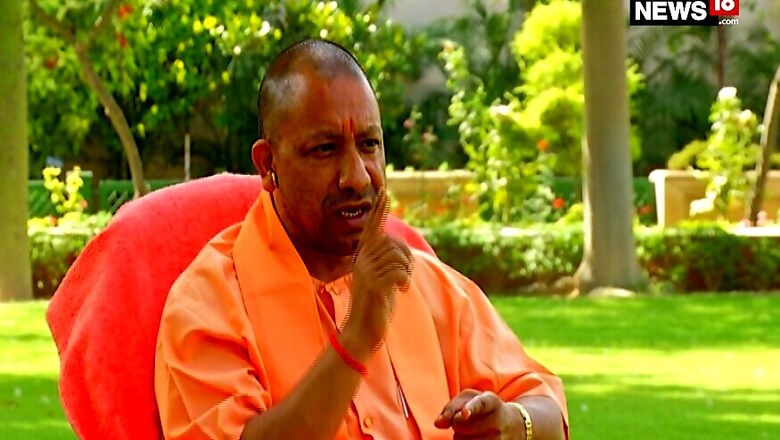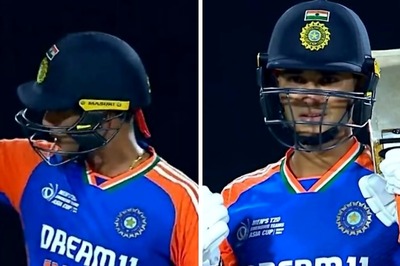
views
Lucknow: Condemning certain media reports for putting out information "without actual facts", Chief Minister Yogi Adityanath maintained that the 2017 Gorakhpur hospital deaths were due to encephalitis and not because of oxygen shortage. He added that the death toll, however, was less that year as compared to 2016.
In an exclusive interview to News18 Network Group Editor-in-Chief Rahul Joshi, Adityanath said, "It was claimed that the reason for deaths in 2017 was deficiency of oxygen and the media showed this for three days straight. They said children died due to oxygen deficiency. When we provide the news without knowing actual facts, we do injustice to people."
Talking further on the issue of 'brain fever' in the state, the chief minister said, "People have been dying of encephalitis in Gorakhpur and eastern UP since the last 20-40 years, but the number of deaths were less in 2017 as compared to 2016."
"We took steps towards prevention and cure of encephalitis. Not only this, I was the first person to bring the issue in front of the world. As an MP, and as a yogi, I started this fight. I took the campaign from streets roads to Parliament," the CM added.
The Adityanath government had drawn flak over the death of scores of children at the BRD hospital in August 2017, months after it came to power. Gorakhpur, which Adityanath represented for nearly 20 years in Lok Sabha, has for long been the epicentre of encephalitis outbreak in the state. According to the state government, more than 5,400 cases of Acute Encephalitis Syndrome (AES) and Japanese Encephalitis (JE) were reported in the state in 2017, leading to 748 deaths.
Reacting to the report of Niti Ayog where Uttar Pradesh stood last on the health index, Adityanath said, "In the Niti Aayog report for 2016-2017, Uttar Pradesh has a very low ranking. But after 2017-2018, I can say that under the guidance of our prime minister, the Niti Aayog selected 115 aspirational districts. If you see the list, UP has a good ranking for the last two years. Secondly, UP has been awarded for decreasing maternal mortality rate in Etawah and Firozabad districts."
The chief minister further claimed that encephalitis has been brought down to "almost zero level" with the cooperation of the health department, and expressed confidence of eradicating the disease from the state.
He also credited the Swachh Bharat mission for helping in containing various diseases in the state and maintaining cleanliness.
"If you talk about the health facilities, the previous government did not take the life support ambulances. Because of that, 23 crore people were deprived of the good facility, especially in case of accidents or during cardiac arrest. I took charge in March and we approached the central government in April. We got 150 life support ambulances. We provided two to each district. During the beginning of this year, we asked for 100 more ambulances and we got them. Today, we have 250 life support ambulances in the entire state," the CM said.
“I think we helped one lakh people during their critical hour by providing them better medical facilities. We saved lives. From 1947 to 2016, there were only 12 medical colleges in the state. From 2016 to 2019, we built 15 medical colleges and we even started admissions this year in some colleges. Uttar Pradesh has 2 AIIMS, in Gorakhpur and Rae Bareli. We have also strengthened the district hospitals. There is lot to be done in this field. We have sent national mobile medical vans to villages where doctors were not willing to go. We implemented this wherever there was an issue,” he further added.
Speaking on revolutionary schemes in the state in the field of health and tele-medicine, CM Yogi Adityanath said, “We tried to provide better medical facilities to everyone. People who had the Ayushman Bharat card got the facilities, but 56 lakh people were deprived of this. We registered them in the Chief Minister Jan Arogya Yojna. This is a process and we are taking technology's help to make it better. We brought tele-medicine facility in placed that doctors never visited. We implemented this in Balrampur district. Balrampur is also a district where doctors never used to visit. We opened a KGMU satellite centre there. Now doctors from KGMU will visit there and this is the system we want implemented.”




















Comments
0 comment